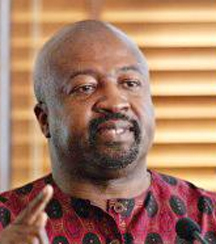Time is running out on the gains made from last year’s elections, according to historian Dr. David Hinds, who warns that the lack of progress on political and racial unity could lead to a situation where people take things into their own hands.
Hinds, the feature speaker at the Walter Rodney Memorial Lecture, held at the Demerara Mutual building on Robb Street on Friday evening, said that if within six months a dent is not made in the current situation or things do not move beyond what is happening in the National Assembly, “we may come to a situation where people take things in their own hands.”
Hinds spoke on the theme, ‘The Walter Rodney Legacy: The Tasks for Political and Racial Unity’ and he traced the developments that led to the current configuration of legislative power. According to him, an “Indian rebellion” against the PPP was manifested by low turn-out, the spoiling of ballots and voting for the AFC. He drew a parallel with Rodney’s support among Lindeners, the heart of PNC’s support in the 1970s. The historian said that the current situation opens up possibilities for race to be discussed in the country.

The November 28, 2011 general elections saw no party win an outright majority, with the PPP/C securing the presidency and opposition forces APNU and AFC winning a one-seat majority in the National Assembly.
According to Hinds, the era of the maximum leader is gone and “we have to take note of where politics is going.” He said that the parties are opening up to new ideas and the “die-hards” are fighting this. The last elections opened up possibilities and while six months is too early to judge, the people have sent a signal and made it clear that they understand their own destiny, he said.
This, Hinds emphasised, is where Rodney is important. The historian said that Rodney was always about the politics of inclusion and now it is up to the political parties to move on what has been set.
APNU, among other things, has to strike a balance on whether to be confrontational or not, while the AFC has to work out how to balance loyalty with its Indo-Guyanese constituency and working with APNU.
Hinds criticised the opposition parties for the way in which it “quickly abandoned the ground” and said that once they did so, they exposed themselves to the “vagaries of the other side.”
He said that governance is not only about those at the top. The Rodneyite legacy is about a unity of equals. It is about the contribution each of the ethnic groups has made for the development of the country, he said.
He added that what happened last year “was a rebellion” and the process is still there. “It is waiting to be harnessed,” he said.
A member of the audience suggested that one of the main problems with Guyanese politics is that central government has all the power. “Rodney was very clear about the decentralisation of power,” said Hinds.
There was a lot of interest in the lecture, which was in observance of the 32nd anniversary of Rodney’s assassination. Organisers hope to make lectures a regular feature.





